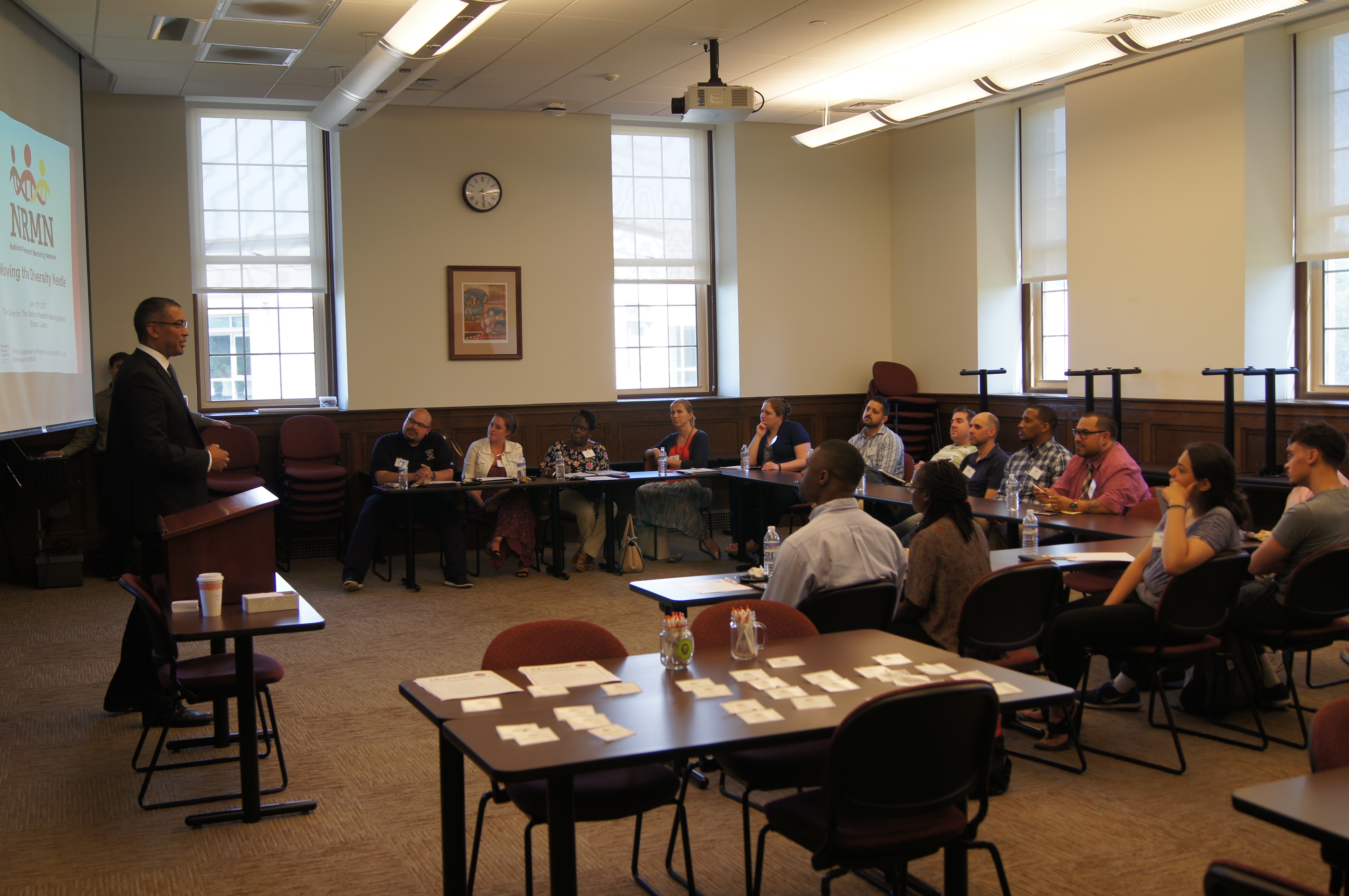By Kevin Enabulele
 On Thursday, June 22nd NRMN hosted a group of 25 individuals consisting of faculty members, students, and researchers from the New England region to attend an “Open House” to discuss the benefits of a more diverse biomedical research workforce and mechanisms to affect greater diversity through involvement in initiatives with NRMN. The event began with an overview of NRMN by Executive Director Dr. Rafael E. Luna, Ph.D. This included topics such as the benefits of mentoring relationships to both the mentor and the mentee and the availability of mentoring opportunities through NRMN for scholars and researchers at all levels of a biomedical career path; including the undergraduate, graduate, post-doctoral, faculty, researcher, and academic administrator levels.
On Thursday, June 22nd NRMN hosted a group of 25 individuals consisting of faculty members, students, and researchers from the New England region to attend an “Open House” to discuss the benefits of a more diverse biomedical research workforce and mechanisms to affect greater diversity through involvement in initiatives with NRMN. The event began with an overview of NRMN by Executive Director Dr. Rafael E. Luna, Ph.D. This included topics such as the benefits of mentoring relationships to both the mentor and the mentee and the availability of mentoring opportunities through NRMN for scholars and researchers at all levels of a biomedical career path; including the undergraduate, graduate, post-doctoral, faculty, researcher, and academic administrator levels.
Dr. Luna encouraged the attendees to ask questions about the program to promote a productive dialogue, and a lively conversation ensued. While Dr. Luna was explaining the scope of NRMN, an audience member noted that NRMN has been apparently very effective at recruiting and retaining members who identify as female, and was interested to understand the cause of this result given that NRMN has not implemented an explicit recruitment or outreach strategy designed to achieve this.
Assistant Director, Communications and Outreach Drew Simenson followed Dr. Luna’s presentation with a demonstration of the features available on the NRMN website, NRMNet.net, in particular the MyMentor guided virtual mentorship application and the MyNRMN networking application. Attendees were excited to learn that it was possible to use MyNRMN to form and maintain relationships with NRMN members in all 50 states in addition to Guam and Puerto Rico through the networking process and the ability to create closed or open groups as a useful form of communication.
With regard to female representation in the biomedical workforce several women in attendance were kindly asked for their opinion on the matter.
Q: Are you aware that female senior faculty members are one the National Institutes of Health’s groups currently designated as underrepresented? If so what are your thoughts in this?
From Joelle Lomax, Ph.D. Program Director, Faculty Appointments at the Faculty Affairs Department at Harvard Medical School:
A: I am aware, [and] I definitely still see it as a huge problem even if more is being done… often times when you sit in on faculty meetings at major institutions, many times there are only one or two females on a committee of twenty people. It is something that our office is working really hard to figure out the best way to attack. There is not really a clear and simple answer, but I’m sure there are a lot of things that we could all do.
From Maureen T. Connelly, MD, MPH, Dean of Faculty Affairs and an Assistant Professor of Population Medicine at Harvard Medical School:
A: Yes… because of increasing numbers of women [across all career stages] in the pipeline, we may forget that as we ascend the ranks, there aren’t nearly as many women. We have issues with pay equity and we still have issues with sexual harassment. There is much to be dealt with. It doesn’t minimize other issues regarding diversity, but it is certainly an issue we have to keep paying attention to.
According to a study done in 2014 by the American Association of University Professors (AAUP), women were more likely to be found in lower-ranking academic positions. Another study done by the Integrated Postsecondary Education Data System (IPEDS) reported that while women held nearly half (48.4%) of all tenure-track positions in 2013, they held just 37.5% of tenured positions.